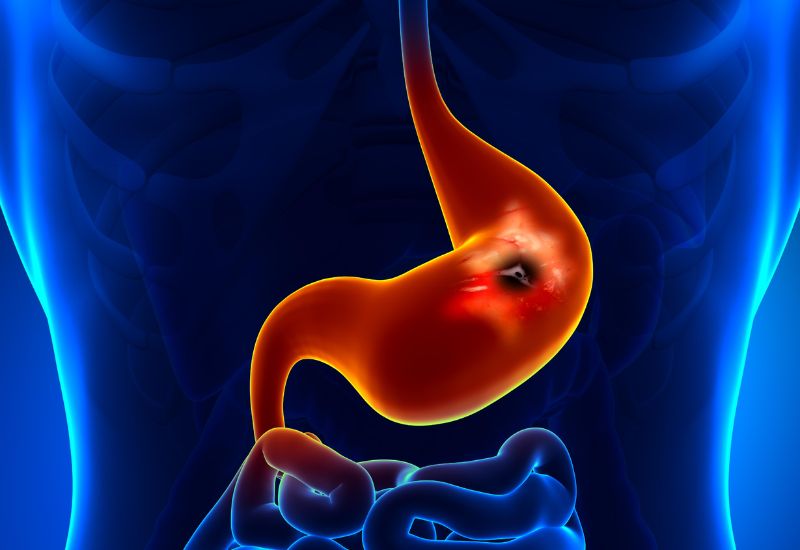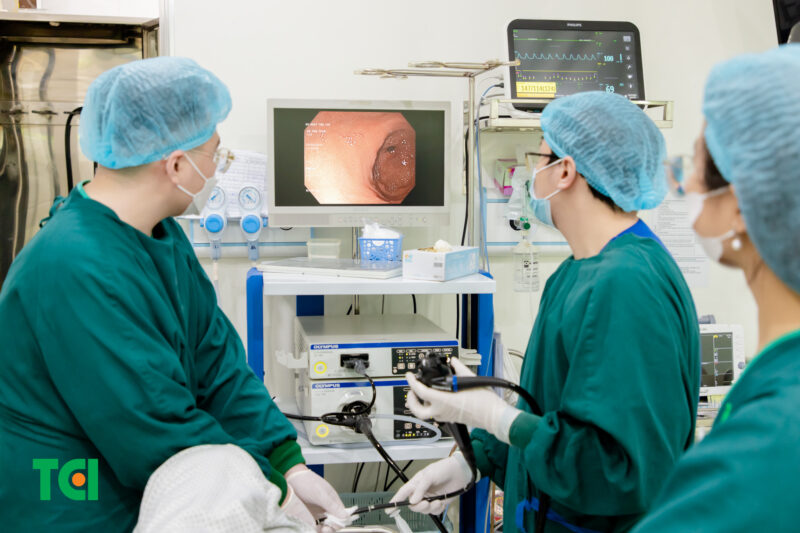Gastric ulcers are a significant digestive condition that require prompt attention. Medical experts advise that at the first sign of symptoms indicative of a gastric ulcer, patients should seek early medical consultation to effectively address the condition and prevent serious complications.
1. Gastric Ulcers: Causes and Symptoms
1.1. Understanding Gastric Ulcers
Gastric ulcers occur when the stomach lining becomes damaged, inflamed, and swollen. Over time, these inflamed areas can develop into ulcers, causing various symptoms. In the initial stages, small ulcers can heal on their own with lifestyle changes. However, most ulcers progress rapidly and cause significant discomfort, necessitating proper treatment.
Gastric ulcers can develop from an acute phase to a chronic condition. Chronic gastric ulcers, if not properly managed, pose risks of severe complications such as gastrointestinal bleeding, pyloric stenosis, stomach perforation, and even stomach cancer.
1.2. Causes of Gastric Ulcers
Two primary factors contribute to the formation of gastric ulcers:
– Helicobacter pylori (H. pylori) Infection: This bacterium is the leading cause of gastric ulcers. After invading the stomach, H. pylori settles in the mucous layer of the stomach lining. It secretes toxins that damage and erode the stomach lining, inhibiting the production of protective factors, thereby leading to ulcer formation.
– Long-term Use of Non-Steroidal Anti-Inflammatory Drugs (NSAIDs): Common NSAIDs such as ibuprofen, naproxen, and diclofenac can cause stomach damage when used for extended periods. These drugs inhibit the synthesis of prostaglandins, substances that protect the stomach lining.
In addition to these main causes, other risk factors include an unhealthy diet, stress, smoking, lack of sleep, and more.

HP infection is the main cause of stomach ulcers.
1.3. Symptoms of Gastric Ulcers
Symptoms of gastric ulcers vary, with epigastric pain accompanied by a burning sensation being the most common. This pain typically worsens when the stomach is empty. Depending on the severity of the ulcer, the pain can last from a few minutes to several hours.
Other symptoms include:
– Bloating and indigestion
– Nausea or vomiting
– Feeling full quickly or loss of appetite due to stomach pain
– Belching or acid reflux
– Difficulty sleeping at night due to stomach pain
– Fatigue and weakness
– Black or bloody stools
– Unexplained weight loss

Patients should seek medical attention if they experience severe abdominal pain and digestive discomfort.
2. When to Seek Medical Consultation for Gastric Ulcers
Patients with gastric ulcers should be aware of when to seek specialized gastrointestinal consultation. Medical experts recommend early examination for the following cases:
– Persistent or recurrent abdominal pain, especially in the upper abdomen, or pain triggered by spicy, fatty foods, or hunger
– Loss of appetite or lack of enjoyment in eating
– Indigestion, bloating, acid reflux, nausea, or vomiting
– Frequent hiccups or difficulty swallowing
– Chronic diarrhea or constipation
– Unintentional, unexplained weight loss
– A history of positive H. pylori infection
– High consumption of seafood or a nutrient-poor diet
– Heavy alcohol or tobacco use
– Overweight or obesity
– Family history of stomach or colorectal cancer
3. Examination Process for Gastric Ulcers at Thu Cuc TCI
Patients undergoing gastrointestinal examination at Thu Cuc TCI follow a three-step process: Initial Consultation; Laboratory Tests and Endoscopy; and Results Review and Treatment Plan.
3.1. Initial Consultation
Patients first undergo a clinical examination with a gastrointestinal specialist. The doctor will take a detailed medical history and determine if endoscopy is necessary. If so, the appropriate type of endoscopy will be recommended.
During the clinical examination, the doctor will:
– Inquire about digestive symptoms and daily abnormalities
– Ask about family medical history, underlying conditions, allergies, and current medications
– Perform an abdominal exam and listen to the heart and lungs
3.2. Laboratory Tests and Endoscopy
Endoscopy is the preferred method for accurately diagnosing gastrointestinal conditions. Patients will undergo necessary blood tests, including complete blood count, coagulation tests, hepatitis (A, B, C) tests, and HIV testing. Following these tests, endoscopy preparations will be made according to guidelines.
The endoscopy procedure involves multiple steps to ensure a safe and accurate diagnosis. Typically, a gastric endoscopy takes about 15-20 minutes. If additional interventions like bleeding control, foreign body removal, or biopsy are required, the procedure may take longer.
After the endoscopy, patients rest for at least 30 minutes, during which their blood pressure is monitored. They then receive the endoscopy results and return to the initial consultation room to discuss the findings with their doctor.

Endoscopy is a modern method for accurately diagnosing peptic ulcers.
3.3. Results Review and Treatment Plan
Based on the endoscopy images, the doctor will diagnose the patient’s condition and determine the extent of the gastric ulcers. The gastroenterologist will provide a detailed explanation of the disease and prescribe a comprehensive treatment plan. Additionally, patients will receive guidance on diet and lifestyle adjustments and be scheduled for follow-up appointments to assess treatment efficacy.
Patients with gastric ulcers are advised to schedule their consultations and endoscopies in advance to receive detailed instructions on pre-examination requirements. Early examination is crucial for successfully managing the condition and preventing complications.








